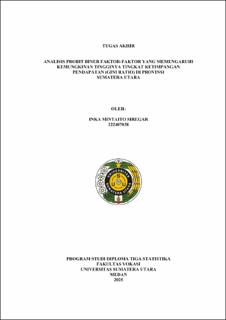Analisis Probit Biner Faktor-Faktor Yang Memengaruhi Kemungkinan Tingginya Tingkat Ketimpangan Pendapatan (Gini Ratio) Di Provinsi Sumatera Utara
Binary Probit Regression Method For Analyzing Factors Affecting The Likelihood Of High Income Inequality (Gini Ratio) In North Sumatera Province
Abstract
Income inequality is a critical issue in economic development and is often measured using the Gini Ratio. This study aims to analyze the factors that influence the likelihood of high income inequality in North Sumatra Province in 2024. The method used is binary probit regression, with the dependent variable being the Gini Ratio category (high > 0.30 = 1, low ≤ 0.30 = 0), and the independent variables include the Open Unemployment Rate (TPT), education, economic growth rate, and poverty level.The data used are secondary data from the Central Bureau of Statistics (BPS), covering 33 districts/cities in North Sumatra. The results show that only the variable of economic growth has a significant effect on the likelihood of high income inequality, with a p-value of 0.036. The marginal effect analysis also shows that a 1 percent increase in economic growth can reduce the likelihood of a region experiencing high inequality. The binary probit regression model used has a classification accuracy rate of 87.88% and is considered a good fit based on the goodness-of-fit test (Prob > chi² = 0.7645). Overall, this study concludes that inclusive economic growth is crucial in reducing inequality. These findings can serve as a basis for formulating equitable development policies across regions in North Sumatra.
Collections
- Diploma Papers [192]

